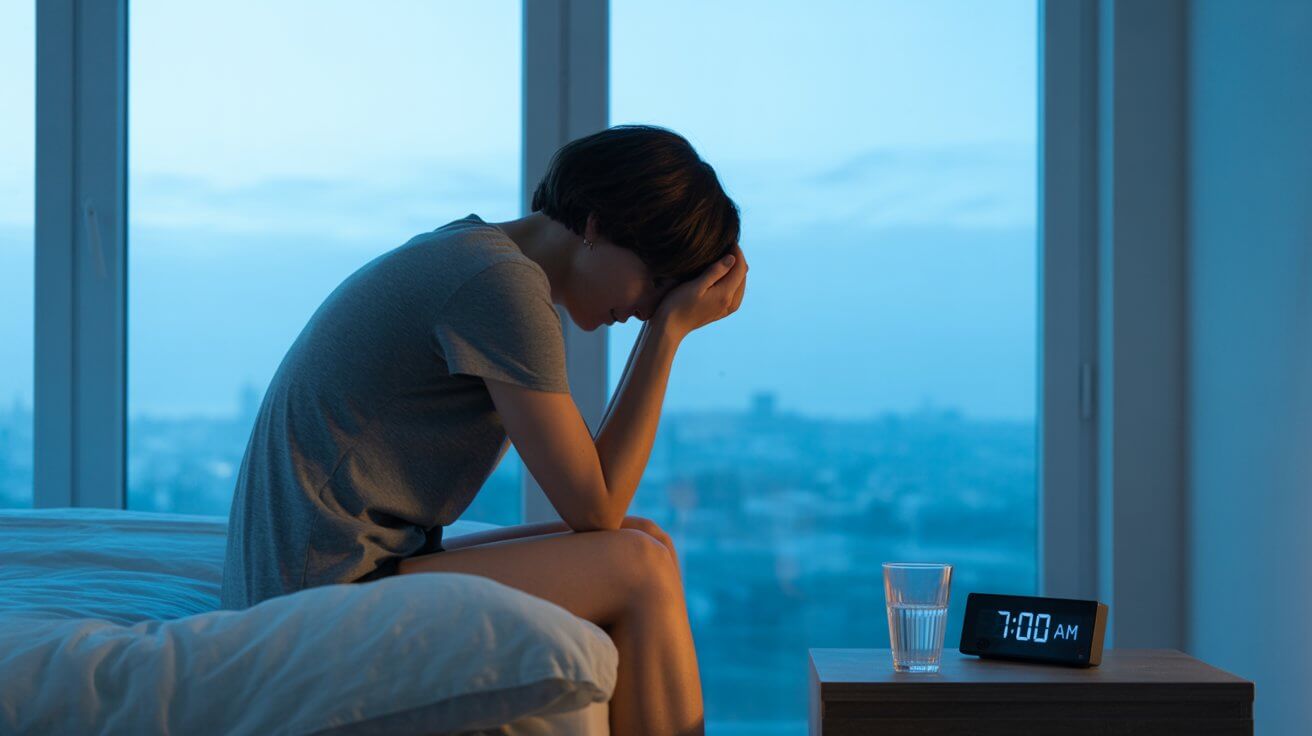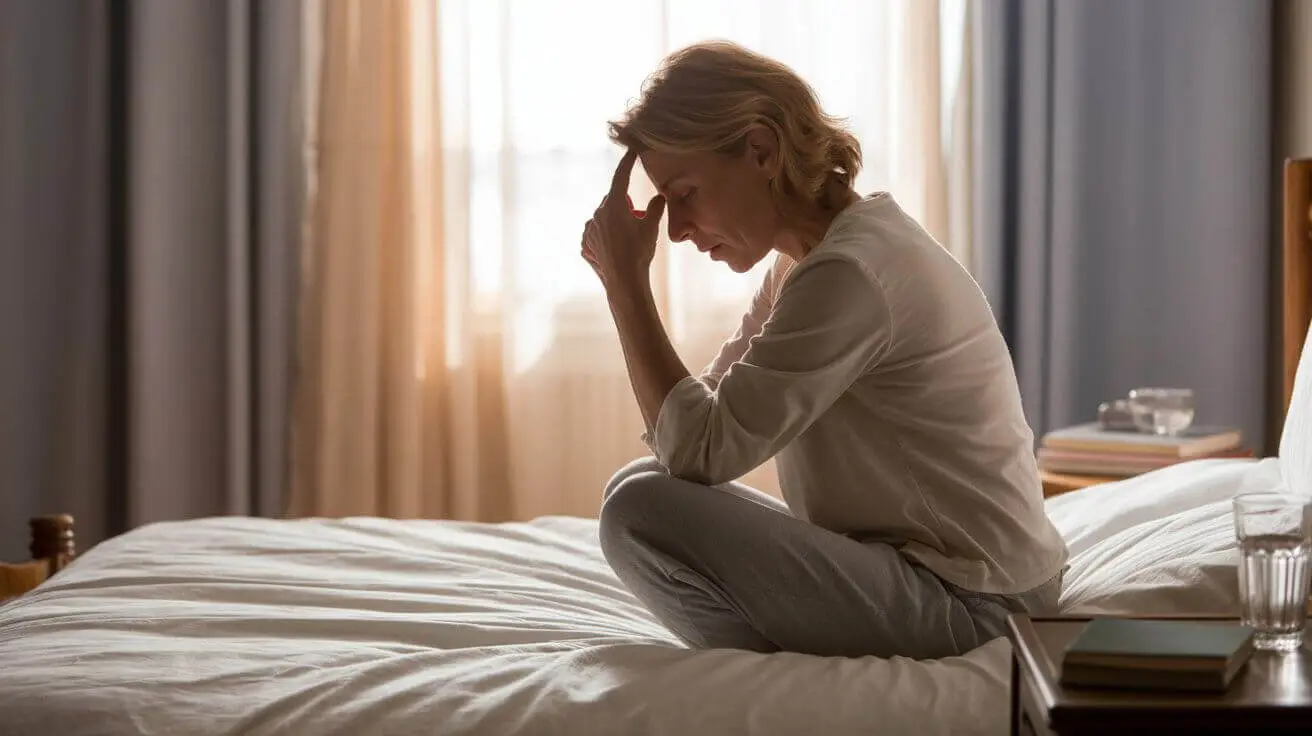It’s a familiar scene for many. The alarm rings, signaling the start of a new day. You went to bed at a reasonable hour, clocked a full eight hours, and yet, as you open your eyes, a wave of exhaustion washes over you. Your body feels heavy, your mind is foggy, and the thought of getting out of bed feels like a monumental task. If this sounds like your typical morning, you’re not alone. The frustrating experience of feeling tired after 8 hours sleep is a common complaint, leaving many to wonder what they’re doing wrong.
The answer often lies not in the quantity of sleep, but in its quality. While hitting the eight-hour mark is a widely accepted goal, it’s only one part of the equation. Sleep is a complex biological process, and for it to be truly restorative, it must be deep, uninterrupted, and cycle correctly through its various stages. When the quality of sleep is compromised, you can spend a full night in bed and still wake up feeling as if you’ve barely slept at all. Understanding the potential reasons behind this unrefreshing sleep is the first step toward reclaiming your energy and vitality.
The Science of Restorative Sleep: More Than Just Hours
Sleep isn’t a passive state of rest; it’s an active period where the brain and body perform critical maintenance tasks. During the night, you cycle through two main types of sleep: Non-Rapid Eye Movement (NREM) and Rapid Eye Movement (REM).
NREM sleep is divided into three stages, progressing from light sleep to the deepest, most restorative stage (N3 or “slow-wave sleep”). This is when your body repairs tissues, builds bone and muscle, and strengthens the immune system. REM sleep, which occurs several times a night, is when you dream. It’s crucial for memory consolidation, emotional regulation, and learning.
For you to wake up feeling refreshed, these cycles must be complete and uninterrupted. If something is constantly pulling you out of the deeper stages of sleep—even for a few seconds, and often without you even realizing it—your brain and body miss out on this essential repair work. The result is waking up tired, a condition often referred to as “unrefreshing sleep.”
More Helpful Reads You Might Like:
Common Culprits Behind Your Persistent Fatigue
If you’re consistently tired after 8 hours sleep, several factors related to your sleep quality, lifestyle, or underlying health could be at play. It’s important to consider these possibilities with curiosity rather than alarm, as many are within your control to change.
Poor Sleep Hygiene and Environment
Sleep hygiene refers to the habits and practices that are conducive to sleeping well on a regular basis. In our modern, hyper-connected world, it’s easy for these habits to slip.
- Inconsistent Sleep Schedule: Going to bed and waking up at different times every day (including weekends) can confuse your body’s internal clock, or circadian rhythm. This internal master clock regulates your sleep-wake cycle, and when it’s out of sync, it can impair sleep quality.
- Screen Time Before Bed: The blue light emitted by phones, tablets, and computers can suppress the production of melatonin, the hormone that signals your brain it’s time to sleep. This can make it harder to fall asleep and may reduce the amount of deep sleep you get.
- The Wrong Sleep Environment: A bedroom that is too warm, too bright, or too noisy can lead to frequent awakenings throughout the night, disrupting your sleep cycles.
Sleep Inertia: The Science of Groggy Mornings
That profound grogginess and disorientation you feel immediately upon waking is a real phenomenon called “sleep inertia.” It’s a transitional state between sleep and wakefulness, and its intensity and duration can vary. For some individuals, it can be particularly severe and last for an hour or more. Waking up abruptly from a deep sleep stage, for instance, can trigger more intense sleep inertia than waking up from a lighter stage of sleep. While it’s a normal part of the waking process, chronic issues with sleep quality can make it feel much worse.
Subtle Sleep Disruptions You Might Not Notice
Sometimes, the problem isn’t obvious. Certain conditions cause dozens or even hundreds of “micro-arousals” per night. These are so brief that you don’t fully wake up and have no memory of them in the morning, but they are significant enough to prevent you from reaching and staying in deep, restorative sleep.
- Sleep Apnea: This is a common and serious sleep disorder where breathing repeatedly stops and starts. These pauses trigger a survival reflex that briefly wakes you up to resume breathing. While it’s a life-saving mechanism, it wreaks havoc on sleep architecture. Loud snoring, gasping for air during sleep, and morning headaches are potential signs.
- Restless Legs Syndrome (RLS): This condition causes an uncomfortable and often irresistible urge to move your legs, typically in the evenings or at night when you’re at rest. The sensations can make it difficult to fall asleep and may cause movements that disrupt sleep throughout the night.
Lifestyle and Dietary Factors
What you do during the day significantly impacts your sleep at night.
- Alcohol Consumption: While a glass of wine might make you feel sleepy initially, alcohol is a major disruptor of sleep quality. It suppresses REM sleep in the first half of the night and can lead to more frequent awakenings in the second half as it’s metabolized.
- Caffeine Too Late in the Day: Caffeine has a half-life of about 5-6 hours, meaning it can take a long time to clear from your system. A late afternoon coffee or energy drink can interfere with your ability to fall into a deep sleep hours later.
- Nutritional Deficiencies and Fatigue: It’s important to distinguish between poor sleep quality and underlying fatigue. Deficiencies in certain nutrients, particularly iron, vitamin B12, and vitamin D, are well-known causes of persistent fatigue, weakness, and low energy. This type of exhaustion is often not resolved by sleep, no matter how long you rest. If you feel tired throughout the day despite sleeping enough, it may be a sign that your body lacks the essential resources it needs for energy production, a separate issue from the mechanics of sleep itself.
Underlying Health Conditions
Sometimes, persistent fatigue is a primary symptom of a broader medical condition that requires diagnosis and treatment. While lifestyle changes are always beneficial, they may not be enough if an underlying issue is the root cause. Some conditions known to cause significant fatigue include:
- Mood Disorders: Conditions like depression can profoundly impact energy levels, making you feel exhausted regardless of how much you’ve slept. Unrefreshing sleep is a classic symptom.
- Thyroid Issues: Hypothyroidism (an underactive thyroid) slows down the body’s metabolism, leading to widespread fatigue, sluggishness, and a feeling of being “run down.”
- Anemia: A lack of red blood cells, often due to iron deficiency, means less oxygen is delivered to your tissues and muscles, resulting in weakness and significant fatigue.
- Chronic Fatigue Syndrome (CFS/ME): This is a complex, long-term illness characterized by extreme fatigue that is not improved by rest and is often worsened by physical or mental activity.
Practical Steps Toward More Restorative Sleep
Feeling rested is not a luxury; it’s a biological necessity. If you’re struggling with unrefreshing sleep, here are some evidence-based strategies you can implement.
- Optimize Your Sleep Schedule: Aim to go to bed and wake up around the same time every day, even on weekends. This consistency is one of the most powerful ways to stabilize your circadian rhythm.
- Create a “Wind-Down” Routine: Dedicate the last 30-60 minutes before bed to relaxing, screen-free activities. Read a physical book, listen to calming music, take a warm bath, or practice gentle stretching. This helps signal to your body that it’s time to prepare for sleep.
- Design a Sanctuary for Sleep: Turn your bedroom into a haven for rest. Keep it cool, dark, and quiet. Consider using blackout curtains, an eye mask, earplugs, or a white noise machine to minimize environmental disruptions.
- Be Mindful of What You Consume: Avoid caffeine for at least 8 hours before your intended bedtime. Limit alcohol, especially in the hours leading up to sleep. A large, heavy meal close to bedtime can also interfere with sleep for some individuals.
- Get Morning Sunlight: Exposure to natural light shortly after waking is a powerful cue for your internal clock. It helps to shut off melatonin production and reinforces a healthy sleep-wake cycle, which can improve the quality of your sleep the following night.
When to Talk to a Healthcare Professional
While many causes of unrefreshing sleep can be addressed with lifestyle changes, persistent fatigue can sometimes be a sign of an underlying medical condition that requires professional evaluation. It is advisable to consult a healthcare provider if:
- Your fatigue is severe, persistent, and interferes with your daily life.
- You suspect you may have a sleep disorder like sleep apnea (e.g., you snore loudly, or a partner has noticed you stop breathing).
- You experience other unexplained symptoms, such as persistent low mood, sensitivity to cold, shortness of breath, or muscle aches.
- You’ve diligently improved your sleep hygiene for several weeks with no improvement.
A healthcare professional can help determine the cause of your fatigue, which may involve blood tests to check for nutritional deficiencies, anemia, or thyroid function, as well as evaluating for other conditions.
Waking up tired after a full night’s sleep can be incredibly disheartening, but it is often a solvable problem. By focusing on the quality of your rest and being mindful of the habits that shape it, you can take meaningful steps toward waking up feeling genuinely refreshed, energized, and ready to embrace the day.
Frequently Asked Questions (FAQ)
1. How long does it take for better sleep hygiene to work?
Improving sleep hygiene is a gradual process, and its effects can vary from person to person. Some individuals may notice improvements in their energy levels within a week of implementing a consistent sleep schedule and a relaxing wind-down routine. For others, it might take several weeks to fully reset their internal clock and experience a significant difference in sleep quality. The key is consistency. Sticking with these new habits, even on weekends, gives your body the best chance to adapt and establish a healthier sleep-wake rhythm.
2. Could a “sleep tracking” app or device help me figure this out?
Sleep tracking devices can be useful tools for increasing awareness of your sleep patterns, such as your total sleep time and periods of restlessness. They can motivate you to stick to a consistent schedule. However, it’s important to view their data with a bit of caution. Consumer-grade trackers are not medical devices and their accuracy in measuring deep or REM sleep can be limited. They can sometimes cause “sleep anxiety” if you become too focused on achieving a perfect score. It’s best to use them as a general guide for your habits rather than a definitive diagnosis of your sleep quality.
3. Is it possible I just naturally need more than 8 hours of sleep?
Yes, it’s entirely possible. While eight hours is a common recommendation, individual sleep needs can range from about 7 to 9 hours for most adults. Some people are naturally “long sleepers” and may require 9 or even 10 hours to feel fully rested. If you’ve optimized your sleep hygiene and ruled out other issues, you might experiment by allowing yourself to sleep a little longer for a week or two. If you consistently feel better with more sleep, that may simply be your personal requirement for optimal function.
4. Should I ask my doctor for a sleep study right away?
It’s not always the necessary first step. A good approach is to first discuss your fatigue and any other symptoms with your primary care provider. They can help rule out other potential causes, such as nutritional deficiencies or thyroid issues, and will assess your risk for a sleep disorder. If you have clear signs of sleep apnea, like loud snoring, gasping, or a partner witnessing you stop breathing, your doctor will likely recommend a sleep study (polysomnography). However, for many, focusing on lifestyle and sleep hygiene improvements is the most effective initial action.
Sources & Further Reading
- Rempe, M. J., Best, J., & Terman, D. (2010). A mathematical model of the sleep/wake cycle. Journal of Mathematical Biology, 60(5), 615–644. https://doi.org/10.1007/s00285-009-0276-5
- “Tips for Better Sleep” – Centers for Disease Control and Prevention (CDC). https://www.cdc.gov/healthy-aging/media/pdfs/2024/06/Healthy-Sleep-Healthy-Brain-508.pdf
- “Brain Basics: Understanding Sleep” – National Institute of Neurological Disorders and Stroke (NINDS). (
https://www.ninds.nih.gov/health-information/public-education/brain-basics/brain-basics-understanding-sleep) - “Sleep apnea – Symptoms and causes” – Mayo Clinic. (
https://www.mayoclinic.org/diseases-conditions/sleep-apnea/symptoms-causes/syc-20377631) - “Unrefreshing Sleep” – Cleveland Clinic. https://my.clevelandclinic.org/health/diseases/11429-sleep-disorders
- “Blue light has a dark side” – Harvard Health Publishing. (
https://www.health.harvard.edu/staying-healthy/blue-light-has-a-dark-side) - Ebrahim, I. O., Shapiro, C. M., Williams, A. J., & Fenwick, P. B. (2013). Alcohol and sleep I: Effects on normal sleep. Alcoholism: Clinical and Experimental Research, 37(4), 539‑549. https://doi.org/10.1111/acer.12006










